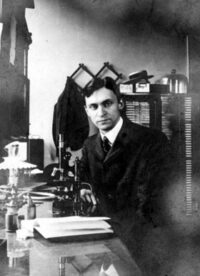Eugene L. Opie Collection

Eugene L. Opie
by unidentified photographer
Collection Overview
Creator: Opie, Eugene Lindsay (1873-1971)
Collection Date: 1894-1955
Extent: 2 linear feet
Biography
Eugene L. Opie was born in Staunton, Virginia. He received his A.B. in 1893 from the Johns Hopkins University and his M.D. as a member of the first graduating class of the Johns Hopkins University School of Medicine in 1897. Opie was a member of the faculty of the school of medicine from 1898 until 1904, when he joined the Rockefeller Institute.
In 1910, he left the Rockefeller Institute to join the pathology faculty at Washington University Medical School in St. Louis. He remained there until 1923, serving as dean from 1912 until 1915. In 1932, Opie became professor of pathology at Cornell Medical School, and in 1940 he returned to the Rockefeller Institute to concentrate on research.
While at Johns Hopkins, Opie published on malaria research and the causes of diabetes. He demonstrated that the islets of Langerhans were involved in the development of diabetes in humans and identified two forms of parasite (hyaline and granular) in crow malaria. After leaving Hopkins, Opie embarked on research in immunology and carcinogenesis, the development of obstruction of the pancreatic duct, and tuberculosis. He remained active in research well into his nineties.
Scope and Content
The Eugene L. Opie Collection spans much of his medical career. It contains lecture notes as well as research and autopsy notes. Opie took extensive notes on lectures he attended while a student at the Johns Hopkins University School of Medicine from 1894 to 1897. These notes are in four volumes: 1)Bacteriology and Pathology, 2) Pathology, 3)Medicine Surgery, and 4) Obstetrics. The lecturers include William Osler, William Halsted, Howard A. Kelly, William H. Welch, William S. Thayer, Simon Flexner, John Whitridge Williams, and Thomas S. Cullen. The two volumes of autopsy notes (1895-1908) mainly concern diabetes and pancreatic pathology. They are indexed by patient number. Another volume of notes is labeled Diabetes; these appear to be notes on published experiments. An undated manuscript, Adoption of Standards of the Best Medical Schools of Western Europe by Those of the United States includes photographs and concerns the history of the medical schools of St. Louis, Missouri. The text discusses Opie’s appointment and refers to other individuals at the Washington University School of Medicine with ties to Johns Hopkins. There is also correspondence (1954-1955) with Alan M. Chesney.
